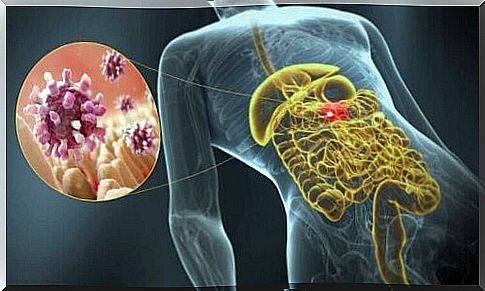Learn About Gastroenteritis, An Acute Inflammatory Condition Of The Digestive Tract

Gastroenteritis is a clinical condition that can cause diarrhea and vomiting due to inflammation of the gastrointestinal tract. Learn about gastroenteritis in this article!
Information on gastroenteritis
Gastroenteritis is a condition that results in diarrhea and vomiting due to inflammation of the gastrointestinal tract. In addition to these symptoms, abdominal pain and cramps can occur, and more severe cases can cause severe dehydration.
The most common cause of gastroenteritis is contagious. In this sense, the most common source of microorganisms is viruses in children and bacteria in adults.
Who is affected?

Gastroenteritis is currently one of the most common conditions in the world, with between 3 and 5 billion cases a year. This is one of the main reasons why people go to the doctor in developed countries, which means that it has a huge economic impact.
In many places, there is the greatest risk of infection in times of heavy rain or in winter, due to poorer water quality.
It can affect everyone, but the most affected group is children, especially those under the age of 5, as adults may have developed immunity.
Another thing you should know about gastroenteritis is that developing countries have a high incidence of this condition. This is often due to cholera since there are many areas of poor hygiene where the water is polluted.
Causes of gastroenteritis

As we mentioned above, viruses and bacteria are the most common causes of the condition, although some cases of gastroenteritis are caused by parasites. There is also a lower percentage of cases of non-communicable origin, such as Crohn’s disease or lactose intolerance.
Virus
- rotavirus
- norovirus
- adenovirus
- astrovirus
Rotavirus is the main infectious agent in children, as the risk of infection is also very high due to their lack of immunity and lower level of hygiene. In adults, the main cause of gastroenteritis is norovirus, especially in America.
Viruses are responsible for more than 70% of infectious diarrhea in childhood because children’s immune systems are not as developed as those of adults.
Bacteria
- E. coli
- C. jejuni
- salmonella
- lostridium difficile
- vibrio cholerae
Bacteria often cause gastroenteritis due to food contamination. If the food remains at room temperature, bacteria will spread and the chances of getting an infection increase.
Vibrio cholerae causes cholera. Contaminated food and / or water transmit this disease. Cholera is a common cause of gastroenteritis, especially in African and Asian countries.
Sometimes the use of antibiotics can also promote the manifestation of gastroenteritis. One of the causes of diarrhea in elderly and hospitalized patients is a clostridioides difficile infection.
Information on gastroenteritis: how is it transmitted?
To learn about gastroenteritis, one should also know how the disease is transmitted. This can happen through various mechanisms, but the most common is through physical contact with infected people or through water or contaminated food.
As we mentioned, in many places there is a greater risk of infection in times of heavy rain or in winter, due to the water quality.
The transmission is also associated with poor hygiene and malnutrition, which usually occurs in children. However, the reasons why one can get gastroenteritis are so different that it is impossible to define a single transmission method.
The incubation period

The symptoms of gastroenteritis usually appear 1 to 3 days after infection.
The duration of gastroenteritis can vary. Diarrhea and vomiting usually disappear within the first 3 to 8 days. However, if not treated properly, the diarrhea can end up being chronic.
Furthermore, it is worth noting that adults can develop tolerance, which means that they can be carriers of some infectious agents and not have an infection. In other words, individuals may continue to be contagious after the symptomatic period, so it is important to take certain precautions.
Information on gastroenteritis: symptoms
- vomiting
- diarrhea: when the cause is bacterial, one may have blood in the stool
- abdominal pain
- cramps
Gastroenteritis caused by viruses can also cause fever, fatigue and muscle aches.
Complications
The most common complication of gastroenteritis is dehydration as a consequence of diarrhea. Dehydration is classified as mild (<5%), moderate (5 – 9%) and severe (> 10%).
With moderate and severe dehydration, one can experience sunken eyes, dry mouth and lack of tears. In addition, the individual is less active and the skin loses its elasticity.
Differential diagnosis
- intestinal loop, volvulus
- diabetes
- appendicitis, appendicitis
- celiac disease
- food poisoning
- misuse of laxatives
- inflammatory bowel disease
The diagnosis of gastroenteritis is clinical, so it is necessary to rule out other pathologies.
Information on gastroenteritis: treatment

The treatment of gastroenteritis is mainly based on rehydration as well as good nutrition. It is not advisable to consume sugary drinks because they can aggravate the diarrhea.
The affected individual may use clean water or oral salts to rehydrate the body.
It is recommended that you maintain a regular diet, but that you reduce your intake of sugar and increase your intake of probiotics. Some cases of gastroenteritis can be treated with antiemetics (antibiotics), antibiotics and antispasmodics, but this is unusual.
Prevention and vaccination
The most important preventive measures are good hygiene and that you only ingest unpolluted water and food. Washing your hands reduces the incidence of gastroenteritis by up to 30%.
Rotavirus vaccination programs are currently being implemented, which have proven to be very effective worldwide.
We hope you enjoyed learning about gastroenteritis!









